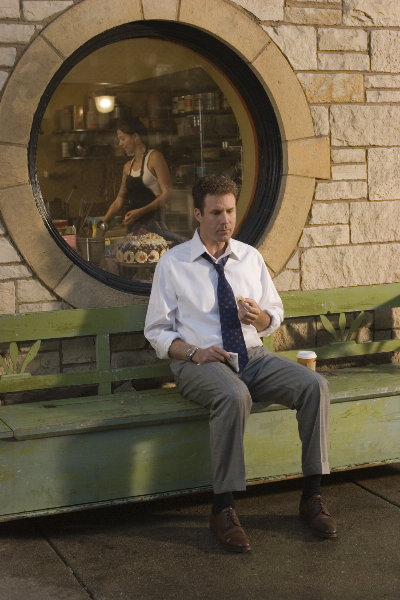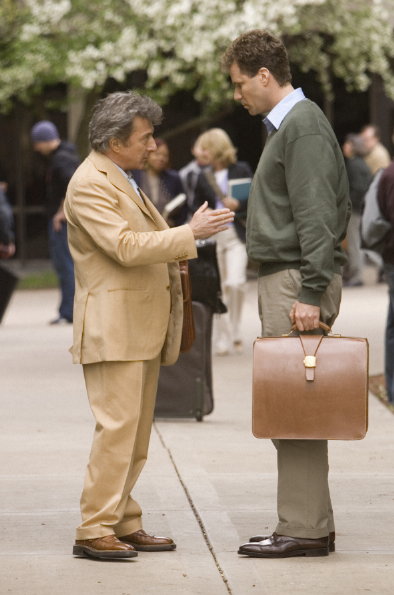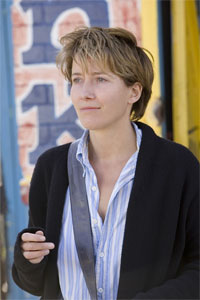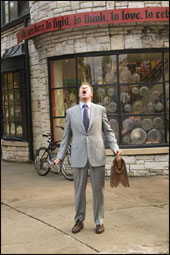Fate, Life, and Art -
A Theological Review of "Stranger than Fiction"
Harold Crick has a problem. He is aware of his fate.
Well, not entirely, but one morning as he is going through his paces he suddenly hears a disembodied voice narrating his every move and commenting on the mundaneness of his routine. He soon realizes that this voice is narrating a story that will culminate with his ultimate demise... and soon.
He sets out on a desparate odyssey to find this disembodied voice and convince the owner not to finish the story. Along the way he contends with his number obsessed colleagues at the IRS, an anarchist baker who becomes the object of his affection, and a professor of literature who tries to guide him through the narrative of his life.
[Spoiler Alert - Plot spoilers ahead. You've been warned.]
 Life as narrative is not a new idea. One theory of psychology puts forward the provocative proposition that we are all storytellers of our own tale and we shape our circumstances, relationships, and choices to fulfill what we think is a stasifying story. One question that confronts Harold is whether he is in a comedy or a tragedy.
Life as narrative is not a new idea. One theory of psychology puts forward the provocative proposition that we are all storytellers of our own tale and we shape our circumstances, relationships, and choices to fulfill what we think is a stasifying story. One question that confronts Harold is whether he is in a comedy or a tragedy.
The big difference here is that Harold's life narrative, instead of being internal as with most of us, is external, disembodied, and seemingly dispassionate.
An irony in this movie is that, in many ways, the perspectives of narrator and character are reversed. Characters in a novel are blissfully unaware of the narrative being spun around them. Not Harold. He is keenly and painfully aware and takes positive steps to thwart his unfolding fate. On the other hand narrators are supposed to be omniscent. But Kay Eiffel (the novelist desparately trying to finish this overdue novel) is completely ignorant of her creation's awareness and rebellion.
 One of the most poignant moments is when Harold, when given the text of his life, end and all, accepts his fate with solemn resolve. Why? Because it is good art. Even the number crunching Harold wants his life to mean something. Professor Hilbert, after reading the novel, tells Harold that he has to die, because everyone dies sometime, and this ending has meaning.
One of the most poignant moments is when Harold, when given the text of his life, end and all, accepts his fate with solemn resolve. Why? Because it is good art. Even the number crunching Harold wants his life to mean something. Professor Hilbert, after reading the novel, tells Harold that he has to die, because everyone dies sometime, and this ending has meaning.
Paradoxically, knowledge of his death puts Harold on the path of life - a life that suddenly has meaning and vitality. Harold makes bold choices, no longer content with counting toothbrush strokes. He woos and wins the love of Ana Pascal, the baker he is auditing who initially loathes him. And, when it comes down to laying down his life to save the life of a boy he does not know, he doesn't hesitate to do it.
 Kay Eiffel goes through a life-embracing transformation as well. She realizes that she can no longer be a dispassionate observer of life. What she describes and how she describes it has an impact. She takes responsibility for her words. Postmodern physics has taught us that the very act of observation affects observed phenomena. Stranger than Fiction simply takes this epiphany to the realm of literature.
Kay Eiffel goes through a life-embracing transformation as well. She realizes that she can no longer be a dispassionate observer of life. What she describes and how she describes it has an impact. She takes responsibility for her words. Postmodern physics has taught us that the very act of observation affects observed phenomena. Stranger than Fiction simply takes this epiphany to the realm of literature.
A perennially taxing question in Christianity is if
a) God is all knowing and
b) all powerful
then is it the case that
c) every step and brushstroke of our life is choreographed from cradle to grave?
In other words, are we free or are we automatons?
 Initially it would seem that Kay is like a god to Harold, dictating his fate. One could also argue that Harold had long ago abdicated the narration of his life, settling for a routine that was predictable, knowable, and unchanging.
Initially it would seem that Kay is like a god to Harold, dictating his fate. One could also argue that Harold had long ago abdicated the narration of his life, settling for a routine that was predictable, knowable, and unchanging.
As a counterexample Harold's love interest, Ana, transformed her fate. She went to Harvard to become a lawyer bent on saving the world. She discovered in the process she made the world a better place one cookie at a time. She changed her narrative. Ana represents that power of transformation that Harold desparately seeks.
Stranger than Fiction is a satisfying exploration of fate, life, and art which begs the question -
What's your story?
- and if you don't like the story you are in -
What are you doing to change it?
[For more reading in Narrative Psychology I recommend The Stories We Live By: Personal Myths and the Making of the Self by Dan P. McAdams.]
 Random Observations:
Random Observations:
- The banner over Ana's bakery (pictured right) says "We are here to fight, to think, to love, to rebel..." which is obviously reflected in Ana's life and more and more so in Harold's life. Does anyone know the source of this? Or is it simply from the movie? Does anyone know if the banner goes on? I missed this in the movie but saw it later in the stills.
- The name Crick put me in mind of the scientist Francis Crick who is the co-discoverer the structure of the DNA molecule, the blueprint for life that all living things carry within our structure. This made me consider that fatalism of biology may also be a subtheme of this movie. Thoughts?
- The name of the baker, Pascal, is possibly reminiscent of Blaise Pascal, the famous 17th century French scientist, philosopher, and theologian who went through a radical shift in life focus following a near death experience. He known for his theological essay "Pensées" ("Thoughts") which struggles with the paradoxes of human existence and includes one of my favorite quotes:
"Le cœur a ses raisons que la raison ne connaît point."
("The heart has its reasons, of which reason knows nothing.")All of which is enlightening to both the character of Ana and the movie itself.
- It's a not so subtle piece of irony that Dr. Hilbert, the literary expert that is trying to help Harold, also works at the college pool as a life guard. This, of course, steepens when Hilbert argues that Harold needs to make the ultimate sacrifice in the name of art.


Comments
L-I have seen the movie and your comments really captured it for me. You did it again.
Posted by: pam barbour | December 9, 2006 2:44 PM
L, I wish I could do w/ movies what you think I do w/ the OT.
lq
Posted by: linda quanstrom | December 13, 2006 4:25 PM
Cool. I read your synopsis after making my own (and doing a search for that sign on the bakery). Very well written. I added a link to your summary from my own. Your blog looks pretty interesting. We seem to share a few common interests.
Phil
Posted by: Phil | February 10, 2007 5:14 AM
The banner on Ana's bakery says, "We are here to fight, to think, to love, to rebel, to bake."
I haven't been able to find out anything else about it but would love to know the story.
Posted by: Laurie | March 20, 2007 9:00 AM
Thanks, Laurie! I really need to watch this again now that the dvd has come out.
Posted by: ironic1 | March 20, 2007 5:43 PM
I watched this film for the first time yesterday, and I've been captivated by it. Your essay captures many of my emerging thoughts and illuminates some devices that I'd missed. Thank you for this!
Posted by: Nic Brown | October 7, 2007 7:05 AM